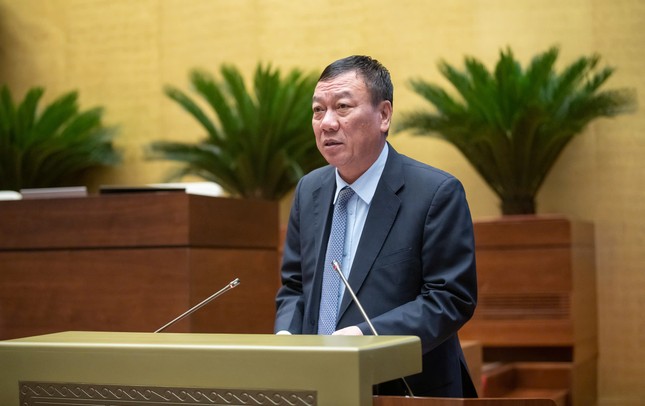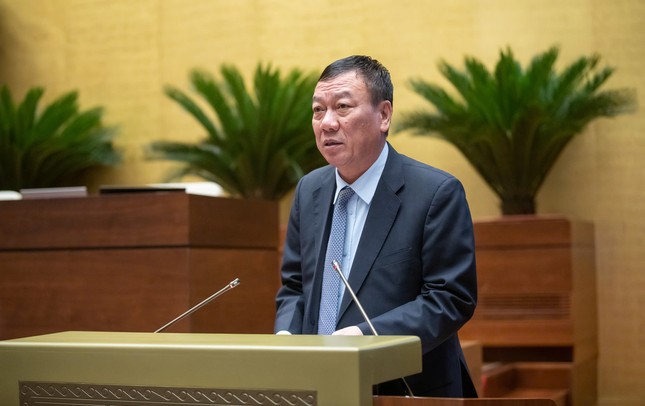On May 8th, Inspector General of the Government Đoàn Hồng Phong presented the National Assembly with a draft of the amended Inspection Law.
The draft amendment streamlines the current law by omitting 54 provisions and outlining the inspection procedures for ministries, general departments and departments under the ministries, inspection agencies in Government bodies, provincial/municipal inspectorates, and district inspectorates.
Consequently, the amended law has reduced over 40% of administrative procedures for 12 ministry inspectorates, 5 general department and department inspectorates, the Vietnam Social Security inspectorate, 696 district inspectorates, 1,001 provincial/municipal department inspectorates, and 53 agencies assigned with specialized industry inspection functions.

Inspector General of the Government Đoàn Hồng Phong. Photo: Như Ý
The draft amendment identifies the following inspection agencies: Government Inspectorate; provincial/municipal inspectorates; inspectorates within the People’s Army, the People’s Public Security, and the State Bank; Cipher Inspectorate; and inspectorates established under international treaties to which Vietnam is a signatory.
Additionally, the draft law unifies inspection activities, eliminating the distinction between administrative and specialized industry inspections present in the current law.
Addressing Challenges and Obstacles
During the review process, the Chairman of the National Assembly’s Law and Justice Committee, Hoàng Thanh Tùng, expressed concerns about the practicality of applying a uniform set of procedures to two distinct types of inspections: administrative and specialized industry inspections, as stipulated in the current law.
The reviewing committee recommended careful consideration of this matter during the implementation process to ensure timely guidance and address any challenges or obstacles that may arise.
According to the proposal, following the reorganization of the inspection system, the Government Inspectorate will assume additional functions and responsibilities of 12 ministry inspectorates, while provincial inspectorates will take on the roles of district and department inspectorates. The draft law expands the tasks and powers of both the Government Inspectorate and provincial inspectorates.
As a result, the Government Inspectorate is expected to undertake inspections related to “the implementation of policies, laws, tasks, and powers of agencies, organizations, units, and individuals under the management of ministries without their own inspectorates” and “compliance with laws in areas under the management of ministries without their own inspectorates.”
The draft law also enhances the role of inspection agencies in preventing waste and adds provisions on power control in inspection activities. Furthermore, it includes regulations on transferring information to investigative agencies during inspections to meet practical demands.
In cases where there are indications of criminal offenses but the extent of consequences or damages is unclear, the information will be forwarded to the competent investigative agency for further investigation and handling in accordance with legal provisions.
The reviewing committee suggested a thorough review to ensure alignment with the organizational model of the inspection agencies post-reorganization.
“Proposed Discount Shopping Center in Ho Chi Minh City to Lure Tourists”
“Red tape is a significant hindrance to the growth and prosperity of Vietnam’s business community. This is according to the Chairman of the Business Association in Ho Chi Minh City, who highlights the cumbersome administrative procedures as a key issue facing enterprises today. The current bureaucratic red tape is stifling the dynamic and innovative spirit of businesses, hindering their ability to adapt, grow, and contribute to the country’s economic development.”
Is the Vietnamese Stock Market Lacking Quality Goods?
The Vietnamese stock market still lacks depth, with large caps predominantly comprising familiar enterprises and few prominent new private conglomerates. To address this issue, policies should focus on accelerating the equitization of state-owned enterprises and fostering an environment conducive to the robust growth of private enterprises.
The Property Market Reset: A New Cycle of Prosperity
Streamlining the multitude of ministries and agencies involved, the investment procedures for a real estate project are expected to be significantly reduced. This presents a golden opportunity for the real estate market to undergo a metamorphosis and achieve unprecedented growth.





















